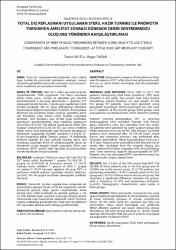Total diz replasmanı uygulanan steril hazır turnike ile pnömotik turnikenin ameliyat sonrası dönemde derin ventrombozu oluşumu yönünden karşılaştırılması
Abstract
AMAÇ: Total diz replasmanında kullanılan steril elastik hazır turnike ile pnömotik turnikenin ameliyat sonrası dönemde gelişebilen derin ven trombozu oluşumuna etkisini incelemek ve sonuçlarını bildirmek.
GEREÇ VE YÖNTEM: 2005-2012 yılları arasında total diz replasmanında (TDR) uygulanan 754 hasta çalışmaya alındı. Hasta sayısı, cinsiyet ve ağırlıkları göz önünde bulundurularak 2 ayrı grup oluşturuldu. 1. gruptaki 377 vakaya pnömotik turnike, 2. gruba aynı sayıda hazır steril turnike kullanıldı. Her iki grup pıhtılaşmayı etkileyen biyokimyasal değerler yönünden incelendi. Pıhtılaşmaya etkileyen ilaç kullanımı, faktör eksikliği, geçirilmiş derin ven trombozu veya riskine sahip hastalar çalışmaya alınmadı. Tüm hastalara aynı cerrahi grup tarafından operasyon gerçekleştirilmiş olup ortalama operasyon süresi 60,2±4,12 (45-100) dakika olarak tespit edildi. Tüm hastalar ortalama19,5±2,18 (10-28) saat sonra mobilize edildi, motor blok bitiminde ayak fleksiyon-ekstansiyon hareketleri uygulatıldı. Hastalar ortalama 5,14±0,92 (3- 9) gün hospitalize edildi. Taburcu sonrası 1-4. haftalarda kontrole çağrıldı. Bu süre zarfında hastalar derin ven trombozu açısından klinik ve ultrasonografik olarak alt ekstremite venöz doppler tetkiki uygulandı. Derin ven trombozu (DVT) pozitif olan hastalara Kardiyovasküler cerrahi tarafından tedavi başlandı.
BULGULAR: İncelenen 754 hasta içinde 165’ inde (%21.8) DVT tespit edildi. Bunlardan 1. grupta 124 (%32.8) 2. grupta ise 41(%10.8) di. Pulmoner emboli 21 (%2.7) hastada teşhis edilirken 1. grupta 19 (%5) 2. grupta ise sadece 2 (%0.5) hastada saptandı. İki grup DVT ve pulmoner emboli gelişimi açısından anlamlı bulundu. (p<0.05). Her iki grupta incelenen demografik özellikler benzerdi.
SONUÇ: Pnömotik turnike uygulanması esnasında alt extremitede yaklaşık 30-40 cm lik bir segmentte sirküler kompresif güçlere bağlı spazm oluşmaktadır, buna karşılık hazır steril turnikede bu genişlik yaklaşık 2 cm dir. Etki altında kalan segment uzunluğu arttıkça damar intimasında olası hasarlanma nedeniyle venöz tromboz riskinin artabildiği görülmektedir. Hazır steril turnikelerin DVT açısından daha az riskli olduğu görülmektedir. OBJECTIVE: We aimed to compare the incidence of deep vein thrombosis (DVT) after total knee arthroplasty with the use of sterile elastic tourniquet and the pneumatic tourniquet.
MATERIAL AND METHODS: From 2005 to 2012, 754 patients undergoing Total knee prosthesis (TKP) were included in this study. Two groups have been formed considering patient number, sex and weight. At the first group, 377 patients have been operated using pneumatic tourniquet. Sterile tourniquet was also used in 377 patients at the second group. Both groups were evaluated for biochemical tests which related to clotting. Patients showing preoperative DVT or receiving anticoagulants were excluded. Patients with known factor deficiency were also excluded from this study. All patients were operated by same surgeon group and mean operation time was 60 (45-100) minutes. All of the patients were mobilised after 19 (10-28) hours. Ankle flexion and extension exercises was performed after following motor block. Mean hospitalization time was 5 (3-9) days. Patients were controlled in the first and fourth weeks after discharge from the hospital. During this time, patients have been evaluated with clinical findings and lower extremity doppler ultrasonography for DVT. Patients who had developed DVT, have been treated by cardiovascular surgery department.
RESULTS: 165 (21.8%) of the 754 patient had DVT. 124 (32.8%) of these patients was in the first group and 41 (10.8%) was in the second group. 21 (2.7%) patients had pulmonary embolism, 19 (5%) patients were in the first group and 2 (0.5%) of these were in the second group. We observed a significant difference between the groups, with a frequency of DVT and pulmonary embolism. (p<0.05). Demographic characteristics were similar in both groups.
CONCLUSIONS: When pneumatic tourniquet was used, spasms had been developed in 30-40 centimeter segment at lower extremity because of circular compressive forces. On the other hand, this segment was only two centimeters when sterile tourniquet was preferred. When affected segment was larger, increasing venous thrombosis risk were shown because of venous intima damage. We thought that the use of a sterile tourniquet decreased the incidence of DVT .
Source
Afyon Kocatepe Üniversitesi, Kocatepe Tıp DergisiVolume
19Issue
3Collections
- Kocatepe Tıp Dergisi [154]



















